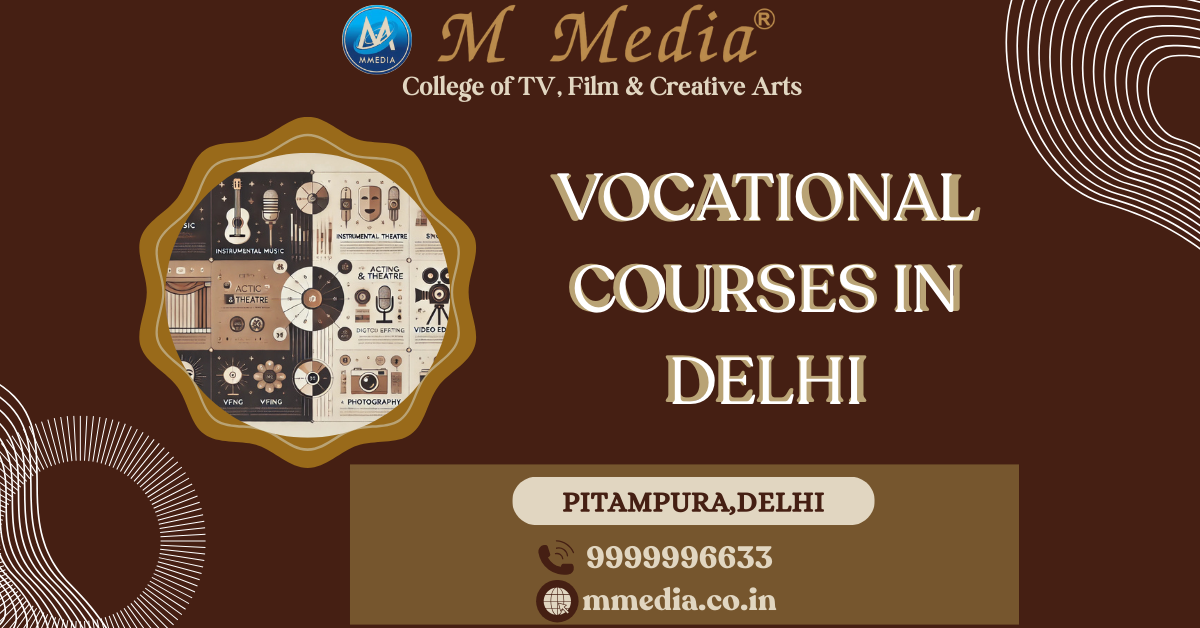
INTRODUCTION:
Vocational Courses In Delhi, Vocational courses are educational programs that focus on practical skills and hands-on training for specific careers or trades. Unlike traditional academic education, which often emphasises theory, vocational education prepares students for direct entry into the workforce by teaching them career oriented skills.
These courses are available in a wide range of fields .They are designed to meet industry standards and are often developed in collaboration with employers to ensure that students learn what is most relevant and needed in the workplace.
Vocational education can be pursued after secondary school, or even alongside it, depending on the structure of the program. It is offered at different levels, including certificate, diploma, and advanced diploma programs. Many vocational courses are shorter in duration than traditional degrees, allowing students to start working and earning sooner.
One of the key benefits of vocational training is that it offers a direct path to employment. It helps students become job-ready by combining classroom learning with practical experience, such as internships, apprenticeships, or on-the-job training. This makes vocational courses an excellent option for those who prefer a more hands-on learning style or wish to enter the workforce quickly.
In today’s fast-changing job market, vocational courses are becoming increasingly important. They help fill the demand for skilled workers and support economic growth by providing training in high-demand sectors. For individuals, vocational education can open doors to stable careers, opportunities for advancement, and even entrepreneurship.
In summary, vocational courses offer a practical and efficient way to gain valuable skills for a successful career. They are ideal for students and working professionals who want to build expertise in a specific field and achieve their career goals in a shorter period of time.
IMPORTANCE:
Vocational Courses In Delhi play a vital role in today’s education system and job market. These courses are designed to provide practical skills and hands-on training that prepare individuals for specific careers or trades. They focus more on skill development than theoretical knowledge, making them highly effective for students who want to enter the workforce quickly.
One of the biggest advantages of vocational education is job readiness. Students gain real-world experience and industry-relevant skills, which helps them become employable soon after completing the course.
Vocational courses are also cost-effective and time-saving. Most programs are shorter than traditional college degrees, which allows students to start working and earning sooner. This is especially important for those who may not have the resources or interest to pursue long academic paths.
Another important aspect is flexibility. Many vocational programs are offered part-time or online, making them accessible to working individuals or those with family responsibilities. This flexibility allows people to upgrade their skills or switch careers without leaving their current job.
From a broader perspective, vocational education helps reduce unemployment by bridging the gap between education and employment. It supports economic growth by providing a skilled workforce to meet the demands of various industries.
For individuals, vocational training can lead to career growth, job security, and personal satisfaction.
BENEFITS:
Vocational Courses In Delhi provide a unique path for learners who prefer skill-based, career-oriented education. Unlike traditional academic programs, vocational training focuses on preparing individuals for specific roles in the workforce with practical knowledge and real-world applications.
One key benefit is that vocational courses are goal-driven. They are designed with a clear career outcome in mind, helping students build targeted expertise in fields such as plumbing, graphic design, healthcare, culinary arts, and many more. This makes the learning process more focused and efficient.
These courses are also known for their hands-on learning approach.
Vocational education is often more accessible than university degrees. The entry requirements are usually simpler, and programs are offered by a wide range of institutions, including community colleges, training centers, and online platforms. This makes it easier for more people, including those from rural or underprivileged backgrounds, to access career training.
Another strong benefit is the quick entry into the job market. Many vocational courses can be completed in less than two years, allowing graduates to start working—and earning—a lot sooner than their peers in traditional degree programs.
For people already working, vocational courses provide a way to upgrade or change careers without starting over. With flexible learning options, including evening classes or online study, these programs can fit around a busy lifestyle.
Vocational training also supports personal and professional growth. It builds confidence, independence, and a sense of achievement as learners see their skills directly impact their job performance.
Finally, these courses are in high demand. As industries continue to evolve, skilled workers are needed more than ever. Vocational training helps fill these gaps, offering long-term career opportunities in stable, growing sectors.


